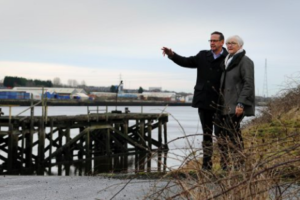
Coal mines as heat sources took another step forward this week a councillors approved an ambitious municipal district heating scheme.
South Tyneside’s hybrid Viking Energy Network aims to use water pumped from 300 metres below the former Hebburn Colliery combined with heat pumps, solar generation and a CHP unit. The scheme will be sited on the Tyne near Jarrow.
Clean heat for eleven council-owned buildings, including a residential tower block, is expected to deliver benefits of £150,000 a year, benefitting the authority and fuel-poor tenants.
The Viking network is priced at £7 million, half of it secured from the EU’s Regional Development Fund. Durham University and the Coal Authority are South Tyneside’s partners. Later this month, councillors will set terms for appointing a contractor.
Cllr Joan Atkinson, council cabinet lead for Area Management and Community Safety, said: “Viking is a highly innovative scheme, and will be one of the first council minewater district heating systems in the UK”.
Hebburn Colliery closed in 1932. Pilot boreholes will be drilled to establish feasibility and key information which will feed into the main scheme’s detailed design.
Officers anticipate carbon savings of 300 tonnes per year. Plans approved last year permit Viking’s future expansion.
Around a quarter of Britain’s homes are thought to be located above or close to defunct coalfields. Depending on depth, seam waters vary in temperature from 10 to 30 degrees. Pumps and heat exchangers, both declining in cost, boost temperatures to the levels required for homes and commercial buildings.
The UK Coal Authority owns the nation’s abandoned mines, and manages around 75 schemes to manage and cleanse seams. Water pumped from the Authority’s pits may contain as much as 80MW of heat in total – enough, the CA’s geologists believe, to heat all homes in coalfield areas.
However, to date, there are few other projects underway. Bridgend Council in 2018 won European funding to renovate its Caerau pit.
A council spokesperson told The Energyst that the scheme is now “in the detailed project development stage”, with Nordic Heat appointed in 2019 to deliver consultancy services through to construction. The target is to have a fully operating heat network in the village by summer 2023 -though other heat sources are also being considered.
Nottingham remains committed to mine-sourced geothermal, which it sees as a string in its bow towards becoming the UK’s first carbon neutral city by 2028.
Last year Nottingham City Council won EU funds to build a technical case for Cinderhill colliery in Bulwell. Water initially at 26 degrees would be drawn up 150 meters into a network serving 60 homes, delivering heat via exchangers.
Head of energy services, Wayne Bexton, suggests £1.5 million would be needed to complete the scheme.
More details of South Tyneside’s Viking Network here. Further details of Nottingham’s minewater plans here.
Related stories:
Can wind, hot rocks, coal mines and salt decarbonise heat?
Eon boss: Renewable power is ‘done’, now for heat and transport
Energy minister Claire Perry: Bring on mine water heat projects
Tender launched for 3.15MW geothermal electricity plant
Nottingham County Council goes large on solar, eyes batteries, mulls mine water energy
Click here to see if you qualify for a free subscription to the print magazine, or to renew.
Follow us at @EnergystMedia. For regular bulletins, sign up for the free newsletter.



